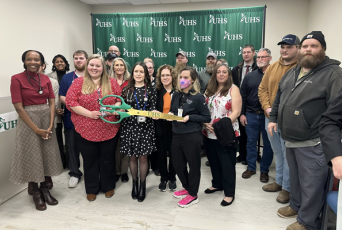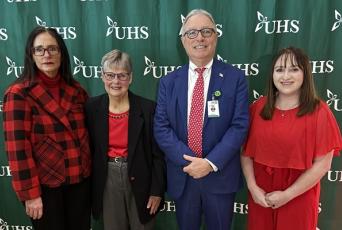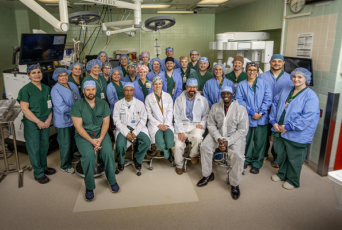
Ophthalmology Services
Ophthalmology is the branch of medicine specializing in the anatomy, function and diseases of the eye. Medical doctors who specialize in diagnosing and treating eye problems, diseases and injuries are known as ophthalmologists.
Common Eye Problems
Some of the many reasons why you may need to see an ophthalmologist include the following:
- Blood in the white of the eye
- Cataracts
- Color blindness
- Diabetic retinopathy
- Diseases of the retina
- Drainage from the eyes
- Eyelid problems
- Eyestrain or vision changes
- Glaucoma
- Inflammation of the middle layer of the eye
- Macular degeneration
- Misaligned eyes or strabismus
- Night blindness
- Red eyes that may be caused by infection, inflammation, or tumors
Ophthalmologists
At UHS, our ophthalmologists are board-certified surgeons who specialize in the diagnosis and treatment of a wide range of eye disorders. They blend expert clinical care with the latest medical technologies for the benefit of our patients.
UHS News
-
 UHS supports tobacco cessation in partnership with St. Joseph's HealthFebruary 13, 2026
UHS supports tobacco cessation in partnership with St. Joseph's HealthFebruary 13, 2026UHS is pleased to announce its continued collaboration with the Central New York Regional Center for Tobacco Health Systems at St. Joseph's Health. Through this partnership, UHS has strengthened its tobacco-dependence treatment policy, aligning it with the Public Health Service Clinical Practice Guidelines.
-
 UHS Pediatrics Upper Front Street holds ribbon-cutting ceremonyFebruary 13, 2026
UHS Pediatrics Upper Front Street holds ribbon-cutting ceremonyFebruary 13, 2026On Thursday, February 12, UHS hosted a ribbon cutting to celebrate the opening of UHS Pediatrics Upper Front Street. The practice, which previously served patients on Chenango Bridge Road, welcomed its first patients at the new location on February 2.
-
 Spotlighting heart health awareness with ‘Go Red for Women’ campaignFebruary 10, 2026
Spotlighting heart health awareness with ‘Go Red for Women’ campaignFebruary 10, 2026People across the country – and throughout the Southern Tier – wore red on Friday, February 6, to raise awareness of heart disease in women as part of National Wear Red Day, a cornerstone of the American Heart Association’s Go Red for Women campaign.
-
 UHS brings next Generation of robotic surgery to UHS Binghamton General HospitalFebruary 09, 2026
UHS brings next Generation of robotic surgery to UHS Binghamton General HospitalFebruary 09, 2026UHS has reached a new milestone in surgical care, becoming the first hospital system in Greater Binghamton to use the da Vinci 5 surgical system for robotic-assisted procedures.





